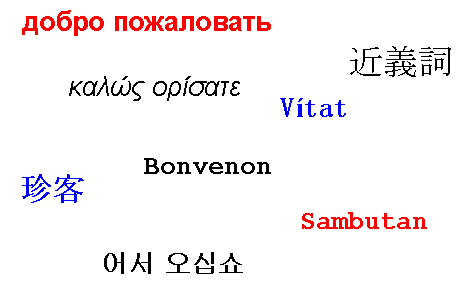Information about this applet
Applet may take some time to initiate.
It needs to search for some fonts

Internationalization (i18n) and Localization (l10n) become very important as more and more non-English speaking people/companies/authorities start using the web (internet or intranet) for publishing and exchanging information in other languages than English.
Internationalization is of special importance to Regulatory departments of pharmaceutical companies, as applications used at these departments must be able to handle information in many languages.
Information about this applet
|
 |
Of all the information in the world, only a fraction is in the English language, and half of the world population doesn't even use the Latin characterset (think about Chinese, Japanese, Arabic, Hebrew, ...). Documents and information in these languages and other character sets now become rapidly available through the internet or on intranets. This information is often stored in databases, and is expected to be exchangable between countries, companies, authorities, etc...
For example, a pharmaceutical company willing to
submit product information on a drug in Europe, has to do so in about 10-20
languages, including languages which do not use non-Latin character sets such
as Greek. If the same product information has to be submitted in
East-European or Asian countries, everything becomes even more complicated.
Usually, pharmaceutical companies make separate dossiers for each country and
language. Doing so, the information gets scattered, and lacks reusability.
Using databases however, with documents stored in XML and Unicode format, the information can be bundled and
made reusable (e.g. for other applications).
The same is of course valid for all other kinds of information with an international character, for example product information for customers all over the world.
Internationalization (sometimes shortened to "i18n , meaning "i - eighteen letters -n") is the process of planning and implementing products and services so that they can easily be adapted to specific local languages and cultures
Localization (sometimes shortened to "l10n") is the process of adapting a product or service to a particular language, culture, and desired local "look-and-feel.
Unicode is an entirely new idea in setting up binary codes for text or script characters. Officially called the Unicode Worldwide Character Standard, it is a system for "the interchange, processing, and display of the written texts of the diverse languages of the modern world." It also supports many classical and historical texts in a number of languages. Currently, the Unicode standard contains 34,168 distinct coded characters derived from 24 supported language scripts. These characters cover the principal written languages of the world. Additional work is underway to add the few modern languages not yet included
